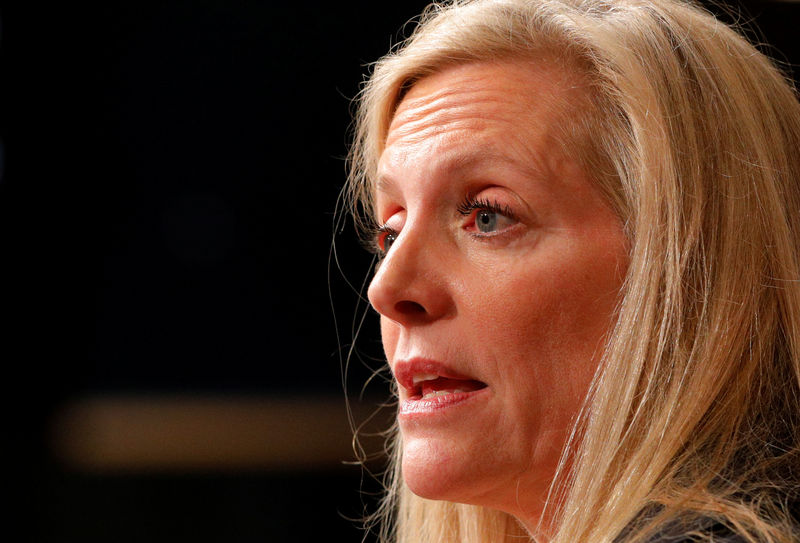By Ann Saphir
SAN FRANCISCO (Reuters) - The U.S. central bank signaled on Friday it may be getting ready to join international peers in incorporating climate change risk into its assessments of financial stability, and may even take it into account when setting monetary policy.
"To fulfill our core responsibilities, it will be important for the Federal Reserve to study the implications of climate change for the economy and the financial system and to adapt our work accordingly," Fed Governor Lael Brainard said in remarks released at the start of the Fed's first-ever conference on climate change and economics.
The Fed, she said, will need to look at how to keep banks and the financial system resilient amid risks from extreme weather, higher temperatures, rising sea levels and other effects of the accumulation of greenhouse gases in the atmosphere.
And increasingly, she said, "it will be important for the Federal Reserve to take into account the effects of climate change and associated policies in setting monetary policy to achieve our objectives of maximum employment and price stability."
Brainard's comments mark a shift for the Fed, which lags other major central banks that have made climate change an explicit part of their financial stability remits. Her talk, the first she's given in her five-year tenure at the Fed that even mentions the subject, suggests she and her colleagues are taking the risks and costs of global warming seriously.
The U.S. central bank's attention to global warming comes even as President Donald Trump's administration denies it exists. Trump on Monday notified the United Nations that the United States will in 12 months leave the Paris Climate Accord, under which 195 nations agreed to reduce greenhouse gas emissions in a bid to prevent catastrophic planetary warming.
Scientists are in broad agreement that carbon dioxide from cars, power plants and other human sources are behind the climate change that's already making powerful hurricanes, severe drought, and other weather extremes more frequent.
RISING RISKS, SLOWING ECONOMIES
The San Francisco Fed's conference, so oversubscribed that a webcast has been created to meet demand, gave policymakers a crash course in research that could change how the Fed forecasts economic growth, regulates banks, and even sets interest rates.
Papers presented at the conference showed how climate change has crimped growth and presented ideas on how policy, including monetary policy, can be used to mitigate harm.
University of Southern (NYSE:SO) California professor Hashem Pesaran showed that rising average temperatures and volatile precipitation - both effects of climate change - have already slowed U.S. economic output in recent decades.
Meeting Paris Accord goals, the paper found, could limit losses to per capita U.S. GDP from planetary warming over the next 80 years to 3% or less, versus 14% if goals are not met.
Swedish central bank economist Conny Olovsson used an economic model to show losses to economic growth from imposing a carbon tax - an objection often raised by politicians and industry - would be dwarfed by the economic losses projected if carbon dioxide remains largely untaxed and global warming continues unchecked.
In a third paper, Nicholas Muller, a professor at Carnegie Mellon University, outlined how the Fed might factor environmental circumstances into monetary policy by, for example, keeping rates lower when pollution levels were increasing, to encourage consumption before they got worse, and higher when pollution was declining, to depress spending until the environment improved.
Fed policymakers appeared receptive to the ideas.
"Climate change is an issue we can't afford to ignore," San Francisco Fed President Mary Daly said at the start of the conference, a day that also marked the one-year anniversary of a fire 150 miles north of San Francisco that killed 85 people and destroyed 14,000 homes, a conflagration blamed in part on climate change. "This is not a hypothetical risk of the future...the risks are here, we have to deal with them."
